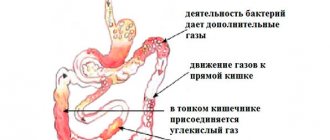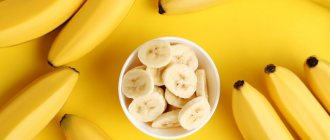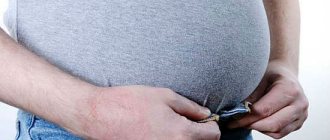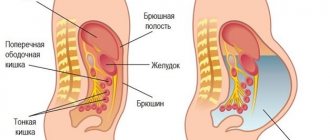The purpose of prescribing a diet for flatulence
The purpose of prescribing a diet to prevent gas formation and flatulence is to normalize impaired intestinal functions and metabolic processes associated with these disorders in the body.
Intestinal gas causes discomfort. Patients may complain of excessive bloating after eating, belching and flatulence, or a combination of these symptoms. To cope with these complaints, patients must understand how the gastrointestinal tract works. With this knowledge, they can take steps to prevent or reduce the severity of their symptoms.
Every time you swallow food, liquid, or even saliva, a small amount of air enters the stomach. In the stomach, food breaks down into small fragments and then enters the small intestine. How quickly does the stomach empty? It usually happens within 1-2 hours. The small intestine gently contracts, moving these liquid food fragments downstream. This is where food - calories, minerals and vitamins - are absorbed. The indigestible liquid waste then reaches the large intestine (intestines). Here, most of the water from the liquid fragments is reabsorbed. This is how feces are formed.
Gas may form at various stages of digestion. Following simple diet and lifestyle guidelines can help reduce pneumatosis intestinalis and relieve symptoms.
Belching
Belching is simply the expulsion of swallowed air from the stomach. The stomach does not produce air or gas on its own. Every time a person swallows food or liquid, they swallow a little air. The more often a person swallows, the more air enters the stomach. Some people are “air swallowers” because they often swallow saliva and air and then regurgitate it.
Belching is rarely a serious problem. Sometimes it can be treated with medication. However, in most cases, the patient can control belching by understanding how it happens and following the simple steps listed above.
Bloating
For unknown reasons, bloating after eating is more common in women. Bloating is usually caused by poor or disorganized contractions in the stomach and upper intestines. Relaxing your abdominal muscles can also play a role in this process. There are now medications that stimulate peristalsis in the stomach and upper intestines. These contractions move food and liquid along the digestive tract, thereby reducing bloating.
Bloating is often part of irritable bowel syndrome, a condition in which there is disorganized bowel movement and spasms. Anxiety and stress play a role in symptoms in some people. Bloating can also be caused by delayed gastric emptying, called gastroparesis. For these reasons, the doctor usually performs certain tests, such as x-rays and gastroscopy. This is a visual examination of the stomach using a flexible, lighted tube. There are other medical conditions, such as malabsorption, and some types of intestinal surgery can be complicated by excess gases in the intestines. These conditions should be treated by a doctor.
Stomach upset from eating certain foods and eating quickly can contribute to bloating and should therefore be avoided. Although bloating can be quite unpleasant, it is usually not a serious problem. This can often be treated with simple dietary changes.
Flatulence
Hundreds of different bacteria live and multiply in the colon. These bacteria live peacefully in our intestines and provide certain positive effects on the health of the body. Most bacteria in the colon are harmless and do not cause problems. These bacteria feed on indigestible food that enters our body. Certain foods are more likely to cause certain bacteria to grow. Some of these bacteria are "gas-forming" bacteria. They generate gases such as hydrogen sulfide and methane. As much as 80-90% of intestinal gas during flatulence is produced by bacteria. Gas-producing bacteria typically feed on certain carbohydrates and sugars. Thus, if these carbohydrates are reduced or eliminated from the diet, flatulence can usually be significantly reduced. Individual reactions to certain foods are also an important factor in causing farts. For example, two people can eat the same amount of carbohydrate food. One person produces a large amount of intestinal gas, while the other experiences little or no discomfort.
What foods lead to flatulence and pneumatosis?
There is not much scientific data to help answer this question. However, experience shows that it is:
- beans (all types);
- milk and dairy products can be one of the main causes of gas in the intestines;
- onions, celery, carrots, raisins, apricots, prunes, flour products and sauerkraut;
These foods may not need to be completely eliminated. Sometimes you can simply limit them. For example, three glasses of milk per day may cause bloating, but limiting milk to one glass per day may not cause problems. Many people complain that adding fiber to their diet causes gas. This problem can usually be reduced by adding fiber gradually over several weeks.
Tips for reducing belching
- Air swallowers should focus on reducing the amount of air they swallow.
- Avoid chewing gum and hard candy; drinking through a straw and a bottle with a narrow neck; Check dentures that may not fit properly. They may increase salivation.
- Avoid carbonated drinks or mineral waters .
- Eat slowly. When you swallow food and drinks quickly, you swallow more air.
Causes of bloating
You overeat
This is perhaps the most common cause of bloating. Smaller portions will help make a difference.
You eat fatty foods
Fat takes longer to digest than proteins or carbohydrates, so the stomach remains full for a long time. Try to limit fats in your diet.
You eat too fast
If you are in a hurry at the table and literally swallow your food, gas will not keep you waiting. Eat more slowly and chew your food thoroughly. The feeling of fullness comes 20 minutes after eating. So devote these 20 minutes to chewing thoroughly. Nutritionists believe that this is what will save you from overeating.
You're gulping air
About half of the gases in the digestive system are air swallowed with food. Try not drinking through a straw, chewing gum, drinking soda, and stopping sucking on candy. Many people swallow a lot of air when stressed. Do breathing exercises to calm your nerves.
Do you eat before bed?
If you like to eat an hour or two before bed, prepare to feel bloated. During sleep, digestion slows down, so all the food will remain dead weight in you until you wake up. If it is not possible to have dinner early, try not to overload your digestive system. Eat something light, such as a piece of fruit or yogurt. You can unwind at breakfast, when your body wakes up and is ready to digest food.
Do you smoke
Yes, yes, smoking also affects the functioning of the digestive tract and may well cause gas formation.
General characteristics of the diet for flatulence, intestinal pneumatosis
The diet to control intestinal gas production must be adequate in calories, protein, minerals and vitamins. Eliminating certain foods from your diet will not limit food variety.
The diet is physiologically complete with the inclusion of foods and dishes that enhance motor function and bowel movements (vegetables, fresh and dried fruits, baked goods, cereals, fermented milk drinks, etc.). Products and dishes that increase fermentation and putrefaction in the intestines and negatively affect other digestive organs (rich in fat, fried foods, etc.) are excluded. Food is prepared unchopped, in water, steamed or baked. Vegetables and fruits are consumed raw and boiled. The diet includes cold first and sweet dishes and drinks.
Consequences of not following the diet
If the diet is neglected, flatulence becomes a constant companion of a person, which means that the normal intestinal microflora dies, and fermentative and putrefactive bacteria begin to become active, which release toxins in the process of vital activity.
Toxins, in turn, are absorbed into the blood and negatively affect not only the organs of the digestive tract (for example, the liver), but also the entire body.
A lack of healthy microflora will lead to hypovitaminosis, since many vitamins are synthesized by normal intestinal microorganisms (vitamin K, B vitamins).
Important! All materials are for reference purposes only and are in no way an alternative to face-to-face consultation with a specialist.
This site uses cookies to identify site visitors: Google analytics, Yandex metrics, Google Adsense. If this is unacceptable to you, please open this page in anonymous mode.
Source
Recommended foods and dishes of diet 3
- Bread and flour products. Wheat bread from 2nd grade flour, Barvikha grain bread, doctoral; if tolerated - rye. Everything is yesterday's baking. Insipid cookies, dry sponge cake.
- Soups. In weak, low-fat meat and fish broth, vegetable broth. Mainly vegetable (borscht, cabbage soup, beetroot soup), with pearl barley, fruit.
- Meat and poultry. Low-fat varieties of various types of meat, chicken, turkey - boiled, baked in one piece, sometimes chopped. Milk sausages.
- Fish. Low-fat types. Piece - boiled, baked. Seafood dishes.
- Dairy products. Milk in dishes. Various fermented milk drinks. Fresh cottage cheese and dishes made from it: puddings, lazy dumplings, cheesecakes, in combination with cereals. Cream. Mild cheese. Sour cream in dishes.
- Eggs. Up to 2 pieces per day. Soft-boiled, steamed omelettes, white omelets in dishes.
- Cereals. Mainly in the form of crumbly porridges and casseroles made from buckwheat, millet, wheat, barley, boiled in water with the addition of milk.
- Vegetables. Beets, carrots, tomatoes, lettuce, cucumbers, zucchini, pumpkin, cauliflower - raw and boiled for side dishes, in the form of casseroles. White cabbage, green peas - boiled and as tolerated.
- Snacks. Salads from raw vegetables and vinaigrettes with vegetable oil, vegetable caviar, fruit salads. Mild cheese, low-fat ham, soaked herring, jellied meat and fish.
- Fruits, sweet dishes and sweets. Fresh, ripe, sweet fruits and berries, raw and in increased quantities in dishes. Dried fruits, soaked and in various dishes (prunes, dried apricots, apricots, figs). Honey, jam, marmalade, pastille, milk caramel.
- Sauces and spices. On weak meat, fish broth, tomato, milk bechamel, less often - sour cream, fruit. Dill, parsley, celery, bay leaf.
- Beverages. Tea and coffee substitutes. A decoction of rose hips and wheat bran, fruit and vegetable juices (from plums, apricots, carrots, tomatoes, etc.).
- Fats. Butter. Vegetable oils - in dishes.
What foods cause gas?
Vegetables and fruits
Legumes and lentils contain oligosaccharides, which can cause bloating. The starch and sugar in some fruits and vegetables cause gas to accumulate in the intestines. These are cabbage (white cabbage, Brussels sprouts, cauliflower), carrots, apricots, prunes. Can't part with your favorite product? Try steaming it. Instead of fructose-rich fruits like melon, eat kiwi. It contains a lot of actinidin, which is a natural enzyme that helps break down proteins and prevents bloating.
Sweeteners
Aspartame, sucralose and sorbitol are difficult to digest, if at all. Artificial sweeteners are a product of the modern world, completely alien to the human digestive system. If it is not possible to completely eliminate them from your diet, try to at least reduce your consumption.
Excluded foods and diet dishes for flatulence
- Excluded from diet 3: bread made from premium flour, puff pastry and butter dough. Savory baked goods with fruits and berries – limited.
- You cannot eat fatty meats, duck, goose, smoked meats, or canned food.
- You should not eat fatty fish, smoked fish, or canned food.
- Excluded from the diet: hard-boiled eggs, fried eggs.
- Exclude from the diet or limit: rice, semolina, sago, vermicelli and pasta, legumes.
- Limit potatoes. Excluded from the diet: radishes, radishes, garlic, onions, turnips, mushrooms.
- Exclude from the diet for flatulence: fatty and spicy foods, smoked foods.
- Diet 3 limits: jelly, blueberries, quince, dogwood, chocolate, products with cream.
- It is not advisable to consume cocoa, natural coffee, and strong tea if you have bloating.
- Excluded from the diet: animal and cooking fats, margarine, spread.
What nutrition principles should you follow?
A diet for flatulence requires adherence to certain nutritional principles, without which success cannot be achieved. As a result, doctors offer the following simple scheme:
- You should allocate a separate time for each meal - there should be no snacks on the run or on the go. Moreover, it is desirable that during the meal period there is a calm environment, no one jerks or distracts. Food should be chewed thoroughly so as not to burden the already exhausted digestive system, and also to prevent additional air from entering the esophagus
- You will have to give up the habit of drinking food while eating - drinking immediately begins to wash away only the produced gastric juice, which immediately causes problems in digestion. You can drink it about half an hour after eating
- It is necessary to establish a diet: ideally, each meal should take place at the same time - this way the body adjusts to proper functioning and ensures the normal course of all processes: at the right moment, gastric juice begins to be released, which contributes to better digestion of food
- You should give up chewing gum: it increases the secretion of gastric juice, which is not a good option.
Sample diet menu 3 for a week for adults
Menu for Monday:
- 1st breakfast: buckwheat with butter + vegetable vinaigrette (vegetable oil instead of sauce) + sweet instant coffee (you can add milk).
- 2nd breakfast: raw apple.
- Lunch: vegetable soup + stewed carrots in milk + meat goulash (lean meat) + compote + crackers.
- Afternoon snack: soaked prunes – 75 g. No more.
- Dinner: lean fish aspic + glass of fish broth + pumpkin-apple casserole + sweet tea.
- Before bed: a glass of kefir with a spoon (stir) of vegetable oil.
Menu for Tuesday:
- 1st breakfast: 100 g of boiled beets with olive oil + pudding (cottage cheese) + sweet tea (can be with milk).
- 2nd breakfast: baked apple.
- Lunch: vegetable soup with barley + cabbage rolls (filled with boiled meat) + milk jelly.
- Afternoon snack: grated carrots (raw) with olive oil or sour cream.
- Dinner: lean fish in marinade + buckwheat + cottage cheese/sour cream + sweet tea.
- Before bed: kefir + a spoonful of vegetable oil.
Menu for Wednesday:
- 1st breakfast: vegetable salad and 50 g of boiled meat + steamed protein omelette with a pot + sweet tea (can be with milk).
- 2nd breakfast: 100 g of fresh berries or 50 g of fresh tomatoes/cucumbers.
- Lunch: borscht without meat + stewed beets + 90 g of boiled meat + compote.
- Afternoon snack: soaked dried apricots.
- Dinner: stewed carrots with meat zrazy + pumpkin soufflé.
- Before bed: kefir.
Menu for Thursday:
- 1st breakfast: millet porridge + vegetable salad (tomatoes, green onions, olive oil) + sweet tea with milk.
- 2nd breakfast: apple or 75 g of grapes.
- Lunch: vegetable soup + stewed cabbage with meatloaf (bake) + apple mousse.
- Afternoon snack: cottage cheese.
- Dinner: carrot-apple pudding with prunes + pancakes with meat filling.
- Before bed: kefir.
Menu for Friday:
- 1st breakfast: boiled potatoes with white boiled fish in milk sauce + eggplant caviar + sweet tea (possibly with milk).
- 2nd breakfast: cream.
- Lunch: light broth with small noodles + boiled chicken with cabbage (boiled, cauliflower) + grated apple with honey.
- Afternoon snack – prunes (soaked).
- Dinner: stewed beets + carrot pancakes + sweet tea (with lemon).
- Before bed: yogurt.
Menu for Saturday:
- 1st breakfast: oatmeal + 100 g of boiled meat + 100 g of green peas + sweet tea (can be with milk).
- 2nd breakfast: grated carrots with apples, sour cream for dressing.
- Lunch: vegetable stew with boiled lean meat + cold beetroot soup + tea.
- Afternoon snack: boiled beets, dressing - lemon juice and olive oil.
- Dinner: stewed carrots + cutlets baked in sour cream + cheesecake + sweet tea.
- Before bed: kefir.
Menu for Sunday:
- 1st breakfast: carrot-curd soufflé + herring with vegetable oil (soaked only) + sweet tea (with milk).
- 2nd breakfast: kvass + vegetable salad (apples/cabbage/olive oil).
- Lunch: cabbage soup in vegetable broth + stewed pumpkin + beef stroganoff (boiled meat!) + compote.
- Afternoon snack: boiled beets, for dressing - lemon juice with vegetable oil.
- Dinner: stewed carrots + cabbage schnitzel + meatballs (meat) baked with sour cream + sweet tea.
- Before bed: kefir with a spoon of vegetable oil.
3 diet recipes that will help you add some variety to your table and make it tasty.
Recipe 1 – green borscht. You will need the following ingredients: vegetable broth 0.3 l, 1 beet, 1 carrot, 20 g white roots, 2 tsp. tomato paste, 1 onion, 1 potato, a bunch each of sorrel and spinach, 1 tsp. wheat flour, 3 tsp. sour cream and 1 egg. Beets, carrots and white roots must be chopped into strips and simmered a little. Add tomato paste and onion. Place diced potatoes, chopped spinach and sorrel, and stewed vegetables into the boiling broth. Heat the flour in a frying pan with oil, dilute a little in the broth and add salt, add to the pan. Before serving, put greens, half a hard-boiled egg and a spoonful of sour cream on a plate.
Recipe 2 – steamed meatloaf. You will need the following ingredients: 60 g minced meat, 1 tbsp. milk, 1 carrot, 3 egg whites and 1 tsp. butter. Mix minced meat with milk, salt and egg whites. Mix well. Place the resulting mass on a lightly greased baking sheet, place chopped carrots on top and steam. Before serving, the dish should be topped with sauce or butter.
What foods reduce gas formation?
Asparagus
This is the number one product in the fight against bloating. Asparagus removes excess water, facilitates digestion, relieves intestinal discomfort, and the prebiotics contained in asparagus help the growth of beneficial bacteria.
cucumbers
They contain quercetin, an antioxidant that will help reduce gas. Cucumbers remove excess fluid, they are low in calories, but high in vitamin C, beta-carotene and magnesium.
Bananas
They, like avocados, are rich in potassium. It promotes the removal of water from the body, so it can eliminate bloating caused by excessive consumption of sodium-rich foods. Bananas will also help if bloating is caused by constipation.
Papaya
The fruit is rich in enzymes that break down protein in the digestive system and help the digestion process.
Dairy products
Fennel seeds
Another savior product if you suffer from gas. Fennel relieves cramps and relieves bloating. It’s not for nothing that seed decoctions are prescribed to babies suffering from colic. The seeds can be added to food, made into tea, or simply chewed dry.
The most effective foods in the fight against bloating are celery, pineapple, ripe bananas, papaya and flax seeds. Spices help well: ginger, cinnamon, fennel seeds and rosemary. The latter can be added to the broth or sprinkled on baked vegetables. Plain water also effectively solves the problem.
Ginger
This miracle remedy will not only relieve colds, but also help fight gas. Enzymes contained in the root break down proteins and reduce gas formation. Ginger can be added to smoothies or tea.
Mint or chamomile tea
Herbs relieve muscle tension in the digestive tract and remove gases. Chamomile will also relieve nervous tension and stress.









